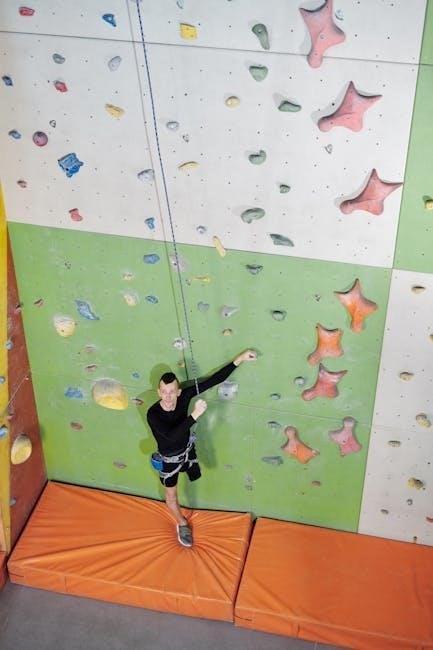Engage with our Fun Mental Health Trivia Questions and Answers PDF! Challenge myths‚ test knowledge‚ and spark conversations through interactive and educational questions.
What Makes Mental Health Trivia Engaging?
Mental health trivia is engaging because it combines education with entertainment‚ making complex topics accessible; Interactive questions challenge myths‚ spark curiosity‚ and encourage open conversations. The mix of fun facts and thought-provoking answers creates a relaxed environment for learning. Trivia also fosters connection‚ as participants share experiences and gain insights. Its interactive nature makes it memorable‚ while the PDF format ensures easy access and sharing. This blend of education‚ interaction‚ and enjoyment makes mental health trivia a powerful tool for awareness and understanding. It’s both informative and entertaining‚ ensuring a lasting impact.
The Importance of Mental Health Awareness Through Trivia
Mental health awareness through trivia fosters understanding and reduces stigma by presenting information in an engaging‚ non-intimidating way. Trivia games encourage participants to learn about mental health in a relaxed environment‚ sparking curiosity and fostering empathy. By sharing facts and myths‚ it empowers individuals with knowledge to support themselves and others. Interactive learning also promotes open conversations‚ breaking down barriers and normalizing discussions about mental wellness. This approach makes mental health education accessible‚ fun‚ and impactful‚ ensuring a broader reach and a more informed community. It’s a simple yet effective way to promote awareness and understanding.
Why Use a PDF Format for Trivia Questions?
Using a PDF format for mental health trivia questions offers convenience‚ accessibility‚ and organization. PDFs can be easily downloaded‚ shared‚ and printed‚ making them ideal for group activities or personal use. The format ensures that questions and answers are neatly formatted and readable on any device. PDFs are also portable‚ allowing users to access trivia anywhere without internet access. Additionally‚ PDFs can include visuals‚ making the content more engaging. This format is cost-effective and widely compatible‚ ensuring that mental health trivia reaches a broad audience effortlessly. It’s a practical choice for delivering educational content in a user-friendly way.

Benefits of Mental Health Trivia
Mental health trivia fosters awareness‚ reduces stigma‚ and encourages open conversations about wellness. It educates while entertaining‚ making complex topics accessible and engaging for everyone involved.
Breaking the Stigma Surrounding Mental Health
Mental health trivia plays a crucial role in breaking down stereotypes and misconceptions about mental wellness. By presenting facts in an engaging and relatable format‚ trivia normalizes discussions about mental health‚ making it easier for people to openly share their experiences. Fun and educational questions help dismantle stigmas by highlighting real-life scenarios and fostering empathy. This approach encourages individuals to view mental health as a natural part of overall wellness‚ rather than something to be ashamed of. Trivia also provides a safe space for learning‚ helping to replace myths with accurate information and promoting a more understanding society.
Encouraging Conversations About Mental Wellness
Fun mental health trivia serves as a powerful tool to spark meaningful conversations about mental wellness. By presenting questions in an engaging and non-threatening way‚ it creates a relaxed environment where people feel comfortable discussing their experiences. Trivia fosters dialogue by encouraging participants to share thoughts and insights‚ helping to normalize mental health discussions. This interactive approach breaks down barriers and promotes understanding‚ making it easier for individuals to open up about their mental health journeys. Engaging in such activities can lead to deeper connections and a greater sense of community‚ ultimately fostering a culture of openness and support.
How Trivia Can Educate and Entertain
Fun mental health trivia questions and answers serve as an engaging way to educate while entertaining. By combining learning with enjoyment‚ trivia makes mental health topics more accessible and less intimidating. It encourages active participation‚ making complex information easier to digest. The structured format of questions and answers helps reinforce key concepts‚ while the competitive or collaborative nature of trivia keeps audiences engaged. This approach not only imparts knowledge but also fosters a sense of accomplishment‚ making the learning process enjoyable and memorable. It’s a unique way to blend education with entertainment‚ ensuring mental health awareness is both informative and fun.

Popular Categories for Mental Health Trivia
Popular categories include mental health myths‚ stress management‚ self-care‚ and historical perspectives‚ offering engaging and informative questions that promote learning while keeping it fun and interactive.
Common Mental Health Myths and Facts
Exploring common mental health myths and facts is a fascinating trivia category. Myth #1: Mental illness is rare. Fact: Millions experience it yearly. Myth #2: People with mental illness are violent. Fact: They’re more likely to be victims. Myth #3: Therapy doesn’t work. Fact: It’s effective for many. Myth #4: Only weak people get mentally ill. Fact: Mental illness affects anyone‚ regardless of strength or background. These questions help dispel misconceptions‚ fostering understanding and empathy. Trivia makes learning fun while promoting accurate mental health knowledge and reducing stigma.
Stress Management and Self-Care Tips
Stress management and self-care are essential for mental wellness. Trivia questions in this category often highlight practical tips‚ such as deep breathing exercises‚ mindfulness practices‚ and time management. Did you know that taking short breaks can boost productivity? Self-care isn’t just about relaxation—it’s also about setting boundaries and prioritizing activities that bring joy. Fun facts might include the benefits of journaling‚ the impact of hydration on mood‚ or how laughter reduces stress hormones. These questions make learning about stress management engaging and accessible‚ encouraging everyone to adopt healthier habits in their daily lives.
Historical Perspectives on Mental Health
Mental health has been misunderstood throughout history. Ancient civilizations often linked mental illnesses to spiritual forces‚ using rituals to “heal” the mind. In medieval times‚ treatments were harsh and misguided‚ such as bloodletting or confinement. The 19th century saw the rise of asylums‚ while the 20th century introduced psychoanalysis and medications. Learning about these evolution of mental health care can be fascinating and enlightening‚ offering a deeper appreciation for modern approaches. These historical facts make for engaging trivia questions that highlight humanity’s journey toward better understanding mental wellness.

Sample Trivia Questions and Answers
Question: What percentage of adults experience stress daily?
Answer: Over 40% of adults face stress daily‚ impacting mental and physical health.
Question: True or False: Anxiety is the most common mental health disorder.
Answer: True; anxiety disorders affect millions worldwide‚ making them the most prevalent.
Question: Which activity reduces stress most effectively?
Answer: Exercise‚ especially aerobic activities‚ significantly lowers stress levels and improves mood.
Question 1: What is the most common type of mental health disorder?
Answer: Anxiety disorders are the most common type of mental health disorder.
Anxiety disorders‚ including generalized anxiety‚ panic disorders‚ and phobias‚ affect millions worldwide. They often co-occur with depression and can significantly impact daily life. Research shows that nearly 20% of adults experience some form of anxiety disorder annually. Early recognition and treatment‚ such as therapy or medication‚ can greatly improve outcomes. Understanding these conditions helps reduce stigma and encourages open conversations about mental health; By addressing anxiety disorders‚ individuals can take proactive steps toward managing symptoms and improving overall well-being. This knowledge is essential for fostering a supportive environment for those affected.
Anxiety disorders‚ such as generalized anxiety‚ panic disorders‚ and social anxiety‚ are the most prevalent mental health conditions globally. According to the World Health Organization‚ approximately 300 million people worldwide experience anxiety disorders annually. These conditions often co-occur with other mental health issues‚ like depression‚ and can significantly impair daily functioning. Understanding the prevalence of anxiety disorders helps reduce stigma and promotes open discussions about mental health. Early recognition and treatment‚ such as cognitive-behavioral therapy or medication‚ can lead to improved outcomes. This awareness fosters a supportive environment for those affected and encourages proactive mental health management.
Question 2: True or False: People with OCD are only obsessed with cleanliness.
Answer: False‚ OCD can manifest in many different ways beyond cleanliness.
While cleanliness and organizing are common obsessions in OCD‚ the condition encompasses a wide range of symptoms. People with OCD may experience intrusive thoughts about harm‚ symmetry‚ or unwanted taboo ideas. Compulsions can include repetitive behaviors like checking‚ counting‚ or arranging objects. These symptoms can significantly interfere with daily life‚ making it essential to understand the diversity of OCD manifestations. Recognizing this variety helps reduce stereotypes and encourages empathy for those living with the condition. Awareness fosters better support systems and promotes seeking appropriate treatment for individuals affected by OCD.
While cleanliness and organizing are common obsessions in OCD‚ the condition encompasses a wide range of symptoms. People with OCD may experience intrusive thoughts about harm‚ symmetry‚ or unwanted taboo ideas. Compulsions can include repetitive behaviors like checking‚ counting‚ or arranging objects. These symptoms can significantly interfere with daily life‚ making it essential to understand the diversity of OCD manifestations. Recognizing this variety helps reduce stereotypes and encourages empathy for those living with the condition. Awareness fosters better support systems and promotes seeking appropriate treatment for individuals affected by OCD. This question highlights the importance of understanding mental health complexities.

Mental Health Trivia for Different Audiences
Mental health trivia can be tailored for various age groups‚ ensuring relevance and engagement. Teens might focus on stress management‚ while adults could explore workplace well-being. Seniors might learn about aging and isolation impacts‚ fostering understanding and connection across generations. This adaptability makes trivia an effective tool for promoting mental health awareness in diverse audiences‚ encouraging open conversations and education.
Trivia for Teens: Understanding Mental Health Basics
Teen-focused trivia can help adolescents understand mental health fundamentals. Questions might cover common disorders like anxiety or depression‚ stress management techniques‚ and the importance of seeking help. Engaging formats‚ such as quizzes or gamified challenges‚ make learning interactive. Topics like self-care routines‚ emotional regulation‚ and healthy relationships can resonate with teens. Trivia also debunks myths‚ reducing stigma and fostering open conversations. By incorporating relatable scenarios and age-appropriate language‚ mental health trivia becomes a powerful tool for educating teens about their well-being in a fun and approachable way.
Trivia for Adults: Managing Work-Related Stress
Adults can engage with trivia focused on managing work-related stress‚ covering topics like time management‚ burnout prevention‚ and mindfulness practices. Questions might explore the impact of stress on physical health or the benefits of setting boundaries. Trivia can also highlight effective coping strategies‚ such as exercise or hobbies‚ to reduce stress. By making learning interactive and fun‚ adults can gain practical insights while fostering a supportive environment for discussing workplace well-being. This approach encourages proactive mental health habits and resilience in balancing professional and personal life.
Trivia for Seniors: Maintaining Mental Health in Later Life
Trivia for seniors can focus on mental health topics like cognitive exercises‚ social engagement‚ and coping with age-related changes. Questions might cover memory tips‚ the benefits of hobbies‚ or strategies for staying connected with loved ones. Trivia can also address common concerns‚ such as managing grief or adapting to retirement. By making learning fun and accessible‚ seniors can stay mentally active while gaining insights into maintaining their emotional well-being. This format encourages participation and fosters a sense of community‚ helping seniors thrive in their golden years.

The Science Behind Mental Health Trivia
Mental health trivia engages cognitive functions‚ fostering learning and memory retention while reducing stress through enjoyable interaction‚ supported by psychological research on cognitive stimulation benefits.

How Exercise Affects Mental Health
Exercise significantly impacts mental health by releasing endorphins‚ which reduce stress and improve mood. Regular physical activity lowers symptoms of anxiety and depression‚ enhances cognitive function‚ and boosts self-esteem. Studies show that even moderate exercise‚ like walking‚ can alleviate depression by up to 43%. Physical activity also improves sleep quality‚ further benefiting mental wellness. Group workouts foster social connections‚ reducing feelings of isolation. Incorporating exercise into daily routines creates a natural‚ sustainable way to support mental health‚ making it a key topic in mental health trivia for education and awareness.
The Role of Nutrition in Brain Health

Nutrition plays a vital role in brain health by providing essential nutrients that support cognitive function and mental well-being. Foods rich in Omega-3 fatty acids‚ such as salmon and walnuts‚ enhance brain development and reduce symptoms of depression. Antioxidants found in berries and leafy greens protect the brain from oxidative stress. A diet high in processed sugars and saturated fats can negatively impact mental health‚ increasing the risk of anxiety and depression. A balanced diet‚ including whole grains‚ fruits‚ and vegetables‚ supports the gut-brain connection‚ promoting a healthy gut microbiome that produces neurotransmitters like serotonin. Proper nutrition is key to maintaining optimal brain health and mental clarity.
Sleep and Its Impact on Mental Wellness
Sleep is crucial for mental wellness‚ as it allows the brain to recharge and function optimally. During sleep‚ the brain processes emotions‚ consolidates memories‚ and clears toxins linked to mental health disorders. Lack of sleep can lead to increased stress‚ anxiety‚ and depression‚ while adequate sleep improves mood regulation and cognitive clarity. Most adults need 7-9 hours of quality sleep per night for optimal mental health. Poor sleep hygiene‚ such as irregular schedules or screen time before bed‚ can disrupt sleep patterns. Interestingly‚ studies show that sleep deprivation can impair mental health more than nutrition. Prioritizing sleep is essential for overall well-being.

Creating Your Own Mental Health Trivia
Creating engaging mental health trivia involves balancing educational content with fun elements. Include myth vs. fact questions to dispel misconceptions. Ensure accuracy and positivity‚ avoiding stigmatizing language. Keep questions clear and answers concise for easy understanding. This approach fosters engagement while promoting mental health awareness effectively.
Tips for Writing Engaging Questions
Tips for Writing Engaging Questions
When crafting mental health trivia questions‚ prioritize clarity and conciseness. Use diverse formats like multiple-choice or true/false to keep participants engaged. Incorporate relatable scenarios and current statistics to make questions relevant. Balance difficulty levels to cater to all audiences. Ensure accuracy by referencing credible sources like mental health organizations. Avoid stigmatizing language and focus on positive‚ uplifting themes. Test questions with small groups to refine wording and ensure understanding. This approach ensures your trivia is both educational and enjoyable‚ fostering a positive learning environment while promoting mental health awareness.
How to Make Trivia Interactive and Fun
Incorporate team-based challenges and individual rounds to cater to different preferences. Use gamification elements like points and badges to boost engagement. Integrate multimedia‚ such as videos or images‚ to make questions more dynamic. Implement time limits for a thrilling experience. Encourage participants to create their own questions for a personalized touch. Offer prizes to motivate active involvement. These strategies ensure trivia is both entertaining and educational‚ fostering a positive environment for mental health discussions.
Using Trivia to Spark Conversations
Trivia is a powerful tool for initiating meaningful discussions about mental health. By presenting thought-provoking questions‚ it encourages participants to share personal experiences and insights. Open-ended questions‚ for example‚ can lead to deeper reflections and foster empathy. Incorporating relatable scenarios or common misconceptions about mental health can also prompt honest dialogue. The interactive nature of trivia helps break down barriers‚ making it easier for people to engage with sensitive topics in a comfortable and supportive environment. This approach not only educates but also builds connections‚ promoting a culture of understanding and openness.

Resources for Mental Health Trivia
Discover reliable sources like NIMH‚ APA‚ and WHO for accurate mental health information. Use educational websites‚ books‚ and social media platforms to gather engaging trivia content regularly.
Where to Find Reliable Information
For accurate mental health trivia‚ rely on credible sources like the National Institute of Mental Health (NIMH)‚ American Psychological Association (APA)‚ and World Health Organization (WHO). These organizations provide evidence-based data and statistics. Additionally‚ educational websites‚ academic journals‚ and government health portals offer trustworthy content. Psychology Today‚ Mental Health America‚ and SAMHSA are also excellent resources. Always cross-check information to ensure accuracy and relevance. Using these sources ensures your trivia is both educational and engaging‚ helping participants gain valuable insights into mental health topics.
Using Quizzes to Test Your Knowledge
Quizzes are a fun and interactive way to test your understanding of mental health topics. They allow you to reinforce learning and identify areas for further study. Platforms like Kahoot or Quizizz can host engaging mental health trivia sessions. Tracking scores helps monitor progress and keeps participants motivated. Incorporating timers or competitive elements adds excitement. Quizzes can also be used in group settings‚ fostering teamwork and discussion. Regularly testing knowledge ensures retention and builds confidence in mental health awareness. This approach makes learning enjoyable while promoting a deeper understanding of mental wellness concepts. It’s a great way to stay informed and engaged.
Sharing Trivia on Social Media
Sharing mental health trivia on social media is a powerful way to spread awareness and engage communities. Platforms like Twitter‚ Instagram‚ and Facebook allow you to post questions and answers in an interactive format. Using features like polls‚ stories‚ or reels can make the content more dynamic. Adding relevant hashtags‚ such as #MentalHealthMatters or #MentalHealthAwareness‚ increases visibility. Sharing trivia not only educates followers but also encourages them to share with others‚ creating a ripple effect. By making mental health conversations accessible and fun‚ you can help normalize discussions and inspire others to prioritize their well-being. It’s a simple yet impactful way to foster a supportive online community.
Mental health trivia is a fun‚ engaging tool for education and awareness. By sparking conversations and reducing stigma‚ it fosters a supportive community focused on well-being.
The Impact of Fun Trivia on Mental Health Education
Fun mental health trivia has a profound impact on education by making complex topics engaging and accessible. It breaks down stigma‚ fosters meaningful discussions‚ and encourages active learning. By presenting information in an entertaining format‚ trivia helps people retain knowledge better and sparks curiosity. This approach not only educates individuals about mental wellness but also promotes empathy and understanding. As a result‚ it creates a ripple effect‚ inspiring others to prioritize their mental health and seek support when needed‚ ultimately contributing to a more informed and compassionate society.
Encouraging Others to Participate
Encouraging others to participate in mental health trivia fosters a sense of community and shared learning. By involving friends‚ family‚ or coworkers‚ individuals can create a supportive environment where mental health discussions become normalized. Sharing fun trivia questions and answers PDFs makes it easy for others to join in‚ sparking conversations and reducing stigma. This collective engagement not only educates but also empowers people to take proactive steps toward mental wellness. Encouraging participation ensures that mental health awareness reaches a wider audience‚ promoting understanding and fostering a culture of care and support.
Final Thoughts on the Importance of Mental Health Awareness
Mental health awareness is crucial for fostering understanding and empathy in society. Fun trivia questions and answers PDFs provide an engaging way to educate people about mental wellness. By sharing knowledge in an accessible format‚ individuals can break down stigmas and encourage open conversations. Awareness leads to better support systems and proactive care. Prioritizing mental health education ensures a more compassionate and informed community. Using trivia as a tool for learning makes the journey toward mental wellness enjoyable and impactful‚ benefiting everyone involved.